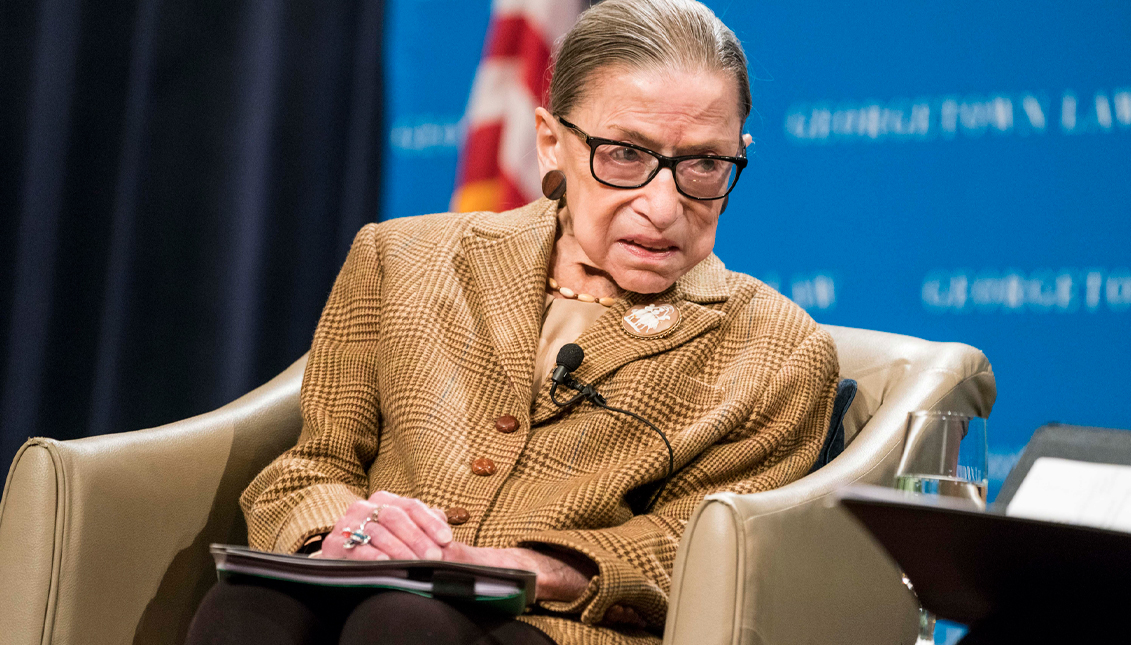
What’s at stake for Latinos after Ruth Bader Ginsburg’s death
Bottom line: Healthcare.
Supreme Court Justice Ruth Bader Ginsburg, a pioneering jurist, died in her home in Washington D.C. on Sept. 18, after a battle with cancer.
Throughout her tenure, Ginsburg made a tremendous impact on Latinx civil rights. She believed in civil rights for all people, and made strong cases for Latinx individuals and immigrants.
However her death opens the door to a potential sixth Republican appointee, and Trump’s third, meaning the Supreme Court may now be firmly entrenched within a conservative agenda.
The issue is, key rulings on cases involving the Affordable Care Act and DACA are coming up, and this time, Ginsburg won’t be there to potentially tip the scale.
“What’s at stake with this Supreme Court vacancy?” began Hispanic Caucus Chair, Rep. Joaquin Castro, reacting to Ginsburg’s death.
Alas, Ginsburg's death raises new alarms about the future of the Affordable Care Act, over which the Supreme Court is scheduled to hear a case the week after the General Election.
“The Right to health care. If Trump/McConnell ram through a nominee, millions of Americans will lose access to health care — during a deadly pandemic. Abbot’s lawsuit to end Obamacare & preexisting conditions at SCOTUS Nov. 10th,” Castro continued.
What’s at stake with this Supreme Court vacancy?
— Joaquin Castro (@JoaquinCastrotx) September 20, 2020
The right to health care.
If Trump/McConnell ram through a nominee, millions of Americans will lose access to health care — during a deadly pandemic.
Abbott’s lawsuit to end Obamacare & preexisting conditions at SCOTUS Nov. 10th
“Let's be clear: a vote to confirm any Trump #SCOTUS nominee is a vote to strike down healthcare coverage for millions during a deadly pandemic,” Rep Nanette D. Barragán (D-CA) wrote on Twitter.
Let's be clear: a vote to confirm any Trump #SCOTUS nominee is a vote to strike down healthcare coverage for millions during a deadly pandemic.
— Nanette D. Barragán (@RepBarragan) September 21, 2020
Healthcare is a top priority for Latinx voters, especially now, at a time when Latinx individuals have been disproportionately affected by the COVID-19 pandemic. In the long term, the absence of Ginsburg could accelerate efforts to further invalidate the Obama-era program.
This means 20 million American could immediately lose health coverage.
Besides healthcare, Ginsburg’s death also makes room for increased voter suppression and further attacks on immigration policy, such as the Deferred Action for Childhood Arrivals (DACA).
RELATED CONTENT
The year 2020 already marks a huge year for voter suppression tactics, which largely silence Black and Latinx voting communities.
Whether it be seen by having just one polling location in a major city — as witnessed during Kentucky’s Senate Primary, Mitch McConnell’s own state — or severe issues with the U.S. Postal Service, which will be the primary form of voting this year — the rights of millions of voters are on the line.
The Latinx demographic will the largest non-white voting demographic eligible to vote this year. But just because we’re eligible to make history, doesn’t mean the powers in play will permit it.
For instance, Ginsburg famously vought Texas’s voter ID law, the strictest in the country, which suppressed the votes of Black and Latinx voters and pulled an all-nighter writing a dissent from a ruling in its favor.
On immigration, Ginsburg will be one less advocate for DACA Recipients, and human rights.
She notably also sided with the Supreme Court’s majority in DHS v. Regents of the University of California, in Jun. 2020, ruling the Trump administration did not adequately file paperwork needed to terminate the program.
Trump, however, promptly resubmitted the paperwork, thereby putting DACA recipients in Limbo until Election Day. Come the next ruling, a conservative-majority Supreme Court diminishes any glimmers of hope.
One thing’s for certain. The death of one Justice has severely altered the course of our General Election, and of our nation. How then, can we call this a Democracy?











LEAVE A COMMENT:
Join the discussion! Leave a comment.